- Home
- Medical news & Guidelines
- Anesthesiology
- Cardiology and CTVS
- Critical Care
- Dentistry
- Dermatology
- Diabetes and Endocrinology
- ENT
- Gastroenterology
- Medicine
- Nephrology
- Neurology
- Obstretics-Gynaecology
- Oncology
- Ophthalmology
- Orthopaedics
- Pediatrics-Neonatology
- Psychiatry
- Pulmonology
- Radiology
- Surgery
- Urology
- Laboratory Medicine
- Diet
- Nursing
- Paramedical
- Physiotherapy
- Health news
- Fact Check
- Bone Health Fact Check
- Brain Health Fact Check
- Cancer Related Fact Check
- Child Care Fact Check
- Dental and oral health fact check
- Diabetes and metabolic health fact check
- Diet and Nutrition Fact Check
- Eye and ENT Care Fact Check
- Fitness fact check
- Gut health fact check
- Heart health fact check
- Kidney health fact check
- Medical education fact check
- Men's health fact check
- Respiratory fact check
- Skin and hair care fact check
- Vaccine and Immunization fact check
- Women's health fact check
- AYUSH
- State News
- Andaman and Nicobar Islands
- Andhra Pradesh
- Arunachal Pradesh
- Assam
- Bihar
- Chandigarh
- Chattisgarh
- Dadra and Nagar Haveli
- Daman and Diu
- Delhi
- Goa
- Gujarat
- Haryana
- Himachal Pradesh
- Jammu & Kashmir
- Jharkhand
- Karnataka
- Kerala
- Ladakh
- Lakshadweep
- Madhya Pradesh
- Maharashtra
- Manipur
- Meghalaya
- Mizoram
- Nagaland
- Odisha
- Puducherry
- Punjab
- Rajasthan
- Sikkim
- Tamil Nadu
- Telangana
- Tripura
- Uttar Pradesh
- Uttrakhand
- West Bengal
- Medical Education
- Industry
Intermittent Glucose Monitoring Significantly Improves Long-Term Blood Sugar Control in Older Adults with Diabetes: Study

Netherlands: A new study published in Diabetes, Obesity and Metabolism highlights the long-term benefits of intermittently scanning continuous glucose monitoring (is-CGM) in older adults with diabetes. Led by Dr. Riemer A. Been from the University Medical Center Groningen, Netherlands, the research highlights the efficacy of is-CGM in improving glycemic control among individuals aged 60 and above living with type 1 or type 2 diabetes.
While real-time CGM systems have already shown promise in older populations, evidence around is-CGM—a less costly and more accessible alternative—has remained limited. To address this gap, the Dutch research team conducted a retrospective case–control study, analyzing data from 353 individuals drawn from their outpatient diabetes clinic between 2015 and 2022.
Among the participants, 142 individuals who initiated is-CGM were matched with 211 control patients who did not use CGM, with matching based on age, sex, diabetes type, and insulin delivery method (pen or pump). The team tracked hemoglobin A1c (HbA1c) levels across several time points—baseline, 3, 6, 9, 12, and 24 months after initiating is-CGM—to determine the technology’s impact on glycemic control.
The study revealed the following findings:
- Findings showed a consistent and sustained improvement in blood sugar control among is-CGM users.
- At three months after starting is-CGM, HbA1c levels dropped significantly more in users compared to the control group (−0.50% vs. −0.01%).
- The HbA1c reductions remained statistically significant at 6 months (−0.46%;) and 24 months (−0.39%), even after adjusting for confounders.
- Baseline HbA1c levels were similar between both groups—7.9% in is-CGM users and 7.8% in controls—indicating that the benefits were not due to differences at the start.
- Adherence to is-CGM was high, with only 2.8% of users discontinuing due to device-related issues.
- No diabetes-related complications were reported in either group during the study period, supporting the safety of is-CGM in older adults.
“This data supports the use of is-CGM among older adults with diabetes, particularly given the low rate of discontinuation and the meaningful reductions in HbA1c,” Dr. Been and colleagues noted. They also suggested that additional education and support may help the small proportion of users who discontinue the device to resume usage successfully.
Despite its strengths, the researchers noted that the study had some limitations. There was an imbalance in the number of type 1 diabetes patients between the two groups, and individuals aged 80 and above were underrepresented. Furthermore, the single-centre design at an academic hospital may limit the broader applicability of the results.
"Still, the study adds valuable evidence supporting the integration of is-CGM in diabetes management strategies for older populations, offering a sustainable and user-friendly tool to enhance long-term glucose control," they concluded.
Reference:
Been RA, van Helsdingen MRX, Zammit D, Grzegorczyk M, Krijnen WP, Tamasi K, Gans ROB, van Beek AP, van Dijk PR. The efficacy of intermittent scanning continuous glucose monitoring in the elderly: A case-control study. Diabetes Obes Metab. 2025 May 13. doi: 10.1111/dom.16417. Epub ahead of print. PMID: 40357716.
Dr Kamal Kant Kohli-MBBS, DTCD- a chest specialist with more than 30 years of practice and a flair for writing clinical articles, Dr Kamal Kant Kohli joined Medical Dialogues as a Chief Editor of Medical News. Besides writing articles, as an editor, he proofreads and verifies all the medical content published on Medical Dialogues including those coming from journals, studies,medical conferences,guidelines etc. Email: drkohli@medicaldialogues.in. Contact no. 011-43720751


